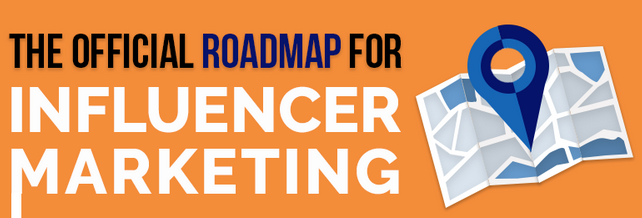Unless you’ve been living under a rock for the past couple of years, you know that influencer marketing is all the rage now. Destinations, hotels and restaurants are keen on working with influencers since these folks usually have many followers on popular, visual platforms such as Instagram, YouTube or perhaps a blog or podcast.
Interested in this topic? Check out our webinar Influencer Marketing Best Practices
In particular, partnerships dealing with micro-influencers enable reaching more targeted, niche audiences with varied or specific interests: fitness, travel, lifestyle, mommy bloggers, LGBT, sports aficionados, fashionista, cultural, foodies, etc.
Road Map for Influencer Marketing

Back in 2016, I shared an infographic focusing on the 10-Step Roadmap for Influencer Marketing in which it clearly states that, just like with any digital marketing tactic, there needs to be measurable goals. In fact, there needs to be an overarching strategy underlining your efforts when it comes to influencers.
That’s the theory, at least. Or rather, that’s how it should be. Unfortunately, that’s not always as it happens! Hotels often receive requests from “influencers” seeking a free night, when not asking for a couple of free nights during a busy weekend… in exchange for, what exactly?
That’s where things get muddy…
What NOT to do if you want a free hotel night
A hotel marketing friend of mine recently voiced his exasperation regarding a so-called “influencer” who had reached out to him, seeking a free night in exchange for some visibility. This fitness-lifestyle influencer had what appears to be a big audience on various platforms, according to his email:
- 80k followers on Instagram
- 95k followers on Facebook
- 80k followers on Twitter
He offered, in exchange for a room night, to post on each of the above social media, as well as in Instagram Stories. Plus, he would include a 5-star review on TripAdvisor.
Wait, what?
First of all, in his email there were no links back to the social media accounts. So in order to validate the information, the marketing team would have to do some digging.
You will also notice that, beyond audience numbers, there is absolutely no information regarding engagement rates on these platforms, or the type of audience. Finally, it’s not ethical to suggest positive reviews as part of any negotiation of this kind.
It’s OK to say no
So the hotelier responded to this influencer at first by stating that while a collaboration may eventually be considered, he could not accept the TripAdvisor “5-star review” component as part of the agreement. He also asked for more details about the nature of the audiences, and mentioned that it would have been nice to get links to the accounts instead of having to seek them out.
Since that information was not provided, the hotelier declined and said no to this influencer. Would you be surprised to hear what came next?

That’s right! This so-called influencer never ended up staying at this luxury hotel yet still managed to write a scathing review on TripAdvisor, giving it the lowest possible score, 1-bubble. Ironic, isn’t it, when he writes “customer service is important”.
Indeed it is, and if you were a customer, you may experience it… but you’re not, you never came and you’re just seeking freebies! 🙁
But I digress.
It only takes a few rotten tomatoes
The thing is, this is not an isolated case. In fact, you may have heard of the White Moose Cafe in Dublin, Ireland last year, that simply decided to ban influencers altogether.
While this is extreme, it does echo a level of dissatisfaction that seems to be running increasingly strong among travel industry practitioners, in particular within the hotel and restaurants business.
Now let’s be clear here: I strongly believe influencers can play an active and important role in the travel marketing mix. That is particularly true whenever this strategy is part of a campaign, with clear goals, measurable metrics, a budget and perhaps a timeline for publications.
Read also: 5 reasons to work with an influencer
The problem seems to be more acute whenever we are dealing with ad hoc requests. How can one validate a request or influencer without clear parameters? And since pretty much anyone can claim to be an influencer with the reality of a social media account with (artificially) inflated follower counts, what gives?
What to DO for a free hotel night
Now while there are no secret formula or magic recipe, in my experience here are some of the things that will get you that free room night next time around:
Introduce yourself
Gee, sounds basic, right? Yet, this is often overlooked. Explain what you do, why you do it, what you are passionate about and what lights your fire. In an ideal world, you would even follow the brand on their social accounts, and perhaps may have interacted with them in the past.
Outline your digital presence
Which platforms are you active on, and why? Are you more of a visual storyteller or you’d rather stick with words on a blog as your main thing? Link to your social accounts, with explanation about the nature of audiences following on each.
Stop focusing on followers!
Yes, numbers matter. It’s great that you have 100k followers on Instagram, or Facebook, but how engaged is your audience? Are they more female or male? Out of Asia, North America or Europe? French-speaking, hispanic or arabic?
Have a Media Kit
Few influencers go through the effort of crafting a professionally-looking media kit, but it’s well worth the effort. A media kit essentially details the elements mentioned above, including stats and analytics from previous campaigns, trafic on your blog or podcast, testimonials from previous partnerships, etc.
What’s in it for the hotel?
We get it, you will get a free room night, perhaps even two or more nights. But why should a hotelier give you a freebie to begin with? This is where you can detail what can be expected in exchange. The more information, the better. For example:
“I will post once on my FB page (average reach is 3,000 followers, average engagement rate of 5%) and once on my Instagram account (average reach is 40,000 followers, average engagement of 8%). I will post 3-5 stories on Instagram, where I reach on average 5,000 users per story”
Now, there is often a misconception that the influencer must post positive stuff. If the experience is average, when not plain out dismal, influencers won’t want to lie to their audiences and lose their trust.
Some will turn a blind eye and not post anything, rather than deceive the hotel or travel partner. Others will post an honest image with the negative aspects of the experience. That’s fine, too. The important thing is to have that discussion prior to making the agreement.
One last thing: leave TripAdvisor reviews out of the equation. Or Google, Yelp, Facebook and any other review site, for that matter. If you want to post a 5-star review after the fact because you are so encline, great. Just don’t make it part of the deal.










Leave a Reply